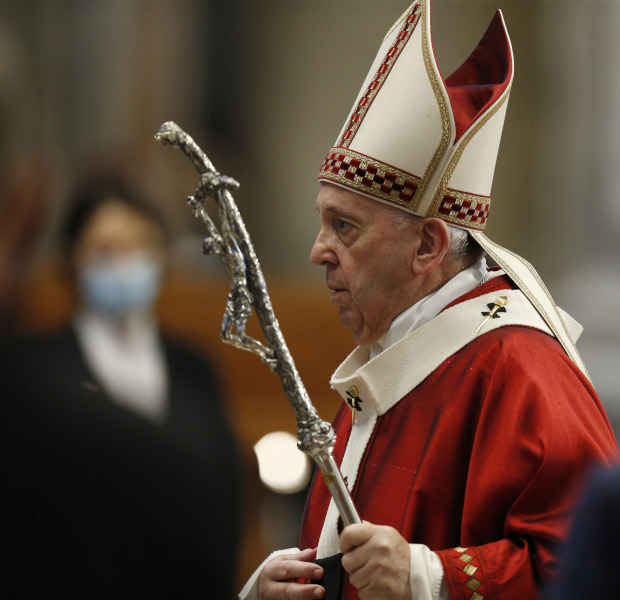
Pope Francis arrives to celebrate Mass marking the feast of Sts. Peter and Paul in St. Peter's Basilica at the Vatican June 29, 2020. (CNS photo/Paul Haring)

Pope Francis arrives to celebrate Mass marking the feast of Sts. Peter and Paul in St. Peter's Basilica at the Vatican June 29, 2020. (CNS photo/Paul Haring)
Pope Francis praised the example of the early Christian community in his homily for the annual feast of saints Peter and Paul June 29, saying its members prayed for their leaders instead of criticizing them.
In a small, socially-distanced Mass in the nave of St. Peter's Basilica, the pontiff recalled how the arrest of St. Peter by King Herod had put the first Christians into a moment of crisis.
"Those Christians did not cast blame; they prayed," said the pope. "No one said: 'If Peter had been more careful, we would not be in this situation.'"
"No, they did not complain about Peter; they prayed for him," said Francis. "They did not talk about Peter behind his back; they talked to God."
"What would happen if we prayed more and complained less?" the pope then asked, before responding: "The same thing that happened to Peter in prison: now as then, so many closed doors would be opened, so many chains that bind would be broken."
Francis' comments may be taken as a reference to the small but vocal group of critics of his own seven-year papacy, who malign him on a range of issues -- from his frequent focus on the expansive nature of God's mercy to his repeated calls for world leaders to do more to combat global climate change.
The pope's homily focused on two main characteristics that he said were shown by the early Christians: unity and prophecy.
Speaking of his desire for a church that is prophetic, Francis said Christians are not prophetic in the way they talk but in the way they serve others.
"If you want a prophetic church, stay quiet and start serving," the pontiff advised.
"We are not to become rich, but rather to love the poor," said Francis. "We are not to save up for ourselves, but to spend ourselves for others."
Advertisement
The feast of saints Peter and Paul commemorates the martyrdom of the two early Christian leaders, and is also a public holiday in the city of Rome.
A centerpiece of the annual Mass is the pope's blessing of a liturgical vestment given by him to the new diocesan archbishops he has appointed that year. Called a pallium, it is a long piece of woolen cloth that signifies the archbishops' role as shepherds and their ties to each other and the pope.
Due to precautions against the spread of the coronavirus, only about 50 people were admitted to take part in the June 29 Mass. Participants wore masks and sat far apart from each other, with most pews sitting at most only two people.
Francis, his liturgical attendants and the ten concelebrating cardinals, however, did not wear masks.
[Joshua J. McElwee is NCR Vatican correspondent. His email address is jmcelwee@ncronline.org. Follow him on Twitter: @joshjmac.]





